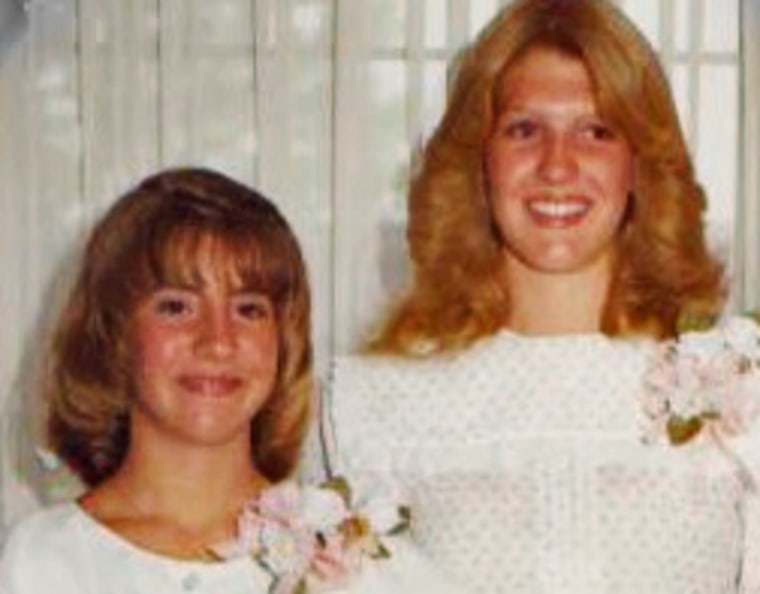Robert Morris, a pastor and the founder of Gateway Church, wanted to know what it was going to take to prevent the woman on the phone from going public with her accusation that he’d sexually abused her as a child.
“Put a price on it,” Morris said on Sept. 22, 2005, according to a document that appears to be a transcript of a phone call. The document was provided to NBC News by a former Gateway staff member.
“It is not a small number,” the woman, Cindy Clemishire, responded, according to the transcript. “Money doesn’t make you happy and I can understand that. So that is not what this is about.”
Morris again pressed her to name a figure.
“Two Million Dollars,” Clemishire said, the transcript shows.
A moment later, Morris ended the conversation.
Nearly two more decades would pass before Clemishire spoke publicly about the years of sexual abuse she says Morris inflicted on her in the 1980s, beginning when she was 12. In response to Clemishire’s account, first published on June 14 by the church watchdog site The Wartburg Watch, Morris confessed in a statement to “inappropriate sexual behavior.” Morris, who served on former President Donald Trump’s spiritual advisory board, resigned last week from Gateway, the megachurch in Southlake, Texas, he founded 24 years ago.
NBC News previously reported on a series of emails between Clemishire and Morris, sent from April to October 2005, in which she asked him to compensate her for her trauma.
“Twenty-three years after you began destroying my life, I am still dealing with the pain and damage you caused,” Clemishire, 35 at the time, wrote on Sept. 20, 2005. “I want some type of restitution. Pray about it and call me.”

Two days later, Morris and his wife, Debbie Morris, called Clemishire, according to the transcript obtained by NBC News. (Clemishire initially told NBC News last week that Morris hadn’t called her in 2005, but after reviewing the transcript, she said she now remembered the conversation.)
NBC News has not heard the audio the document is based on and does not know who made the recording or produced the transcript.
The document — titled “Transcription of recorded phone conversation with Cindy Clemishire” — was provided to NBC News by a former member of Gateway’s IT department. The worker said he discovered the Microsoft Word document more than a decade ago while transferring files from Morris’ computer to a new laptop. The IT worker shared the transcript on the condition that he not be named.
The document sat for years on a shared server at Gateway that primarily held archival sermon notes and was accessible to members of Gateway’s technology teams, the worker said. Metadata from the document shows it was created on Oct. 19, 2007, about two years after the call, at a time when Clemishire said she and Morris were negotiating a possible legal settlement that never materialized. The file was created by someone who listed their title as “Administrator” and company as “Gateway Church,” and has not been modified since the day it was created, according to its metadata.
The IT worker said he remembered skimming the document when he discovered it. At the time, he connected it to a story Morris frequently told from the pulpit about a long ago “moral failure” involving a consensual extramarital affair.
“At the time I heard the original story, I believed that it was refreshing to hear the truth,” the former employee said of Morris appearing to be open about his past sins. “Now I feel foolish.”
Morris and his wife did not respond to messages requesting comment. Lawrence Swicegood, a Gateway spokesperson, said church leaders had not seen the transcript. Swicegood did not comment on the document’s authenticity.
“We take all of this extremely seriously and abuse of any sort simply cannot be tolerated,” he said in an email. “Gateway Church has engaged outside counsel who is conducting an independent and comprehensive inquiry into this entire matter.”
Gateway sex abuse scandal
In a statement, Clemishire said that in 2005, after years of struggling with “profound confusion” about what Morris had done to her, she was finally beginning to understand that it was a crime.
“I was literally sick to my stomach and wanted to finally hold him accountable,” Clemishire said. “The call with Robert Morris had nothing to do with money; it was about my anger and my need to confront him so that he finally knew that I knew what he had done to me.”
The September 2005 call began with Morris notifying Clemishire that his wife was also on the line, the transcript shows.
Note: The transcript contains misspellings and typographical errors, which are reflected in this article.
“Okay,” Morris then said, according to the transcript, “tell us what you need to tell us.”
Clemishire referred to her emails from that year telling Morris that she planned to go public with her story or seek criminal charges against him unless he paid for what he’d done.
“Well, I don’t think money is going to help you,” Morris said, according to the transcript.
“Who said it was going to help me?” Clemishire said, interrupting him. “It is certainly helping you.”
“No, it is not,” said Morris, who by then had published his first book, “The Blessed Life,” and was on a path to becoming a leading national figure among evangelicals. “What is helping me is that since this time I have tired to do the right thing and tried to serve the Lord.”
Morris added that he and his wife love Clemishire and want what’s best for her.
Clemishire, now 54 and working as a real estate agent in Oklahoma, has said Morris was a family friend who had repeatedly molested her in Oklahoma and Texas between December 1982 and March 1987. During that period, Morris was in his 20s, married to Debbie and working as a traveling evangelist and later as a pastor at Shady Grove Church near Dallas.
Morris recounted on the call how he’d left the ministry and sought counseling in 1987 after Clemishire’s father confronted him and church leaders.
Clemishire told Morris he should have paid a steeper price.
“Two years out of the ministry big deal,” she said, according to the transcript. “I just have a real problem the fact that you have gone untouched by this.”
Morris later responded: “Maybe I wasn’t asked to do enough but I did everything I was asked to do.”
Clemishire described on the call watching interviews of people discussing child molestation and connecting those stories to her own experience with Morris, which she said helped her better understand what she’d been through. “I just can’t believe,” she said, according to the transcript, “how I have justified and made excuses.”
She asked Morris to imagine if “this kind of thing” had happened to his daughter, who was a teenager at the time of the call and is now a pastor at a Gateway Church campus in Houston.
“I think you would be horrified,” Clemishire said. “At least I hope you would.”
“Sure, I would,” Morris said, according to the transcript.
Clemishire asked Morris what he would want to happen if he learned that a pastor in his church had committed a crime against a child years earlier.
“Would you not think they should pay?” Clemishire said, according to the transcript. “It may not help you to see that person go to prison. But don’t you believe that they should pay for the crime done?”
“Well,” Morris responded, “I don’t know weather it would be my responsibility for them to pay for the crime done or not.”
“I really honestly feel like it is not fair,” Clemishire continued. “It is not fair for every single thing that I have gone through and still going through and for you to have no reprocitions.”
“Well, I have had a lot of reprocitions over the years,” Morris said, according to the transcript, apparently meaning repercussions.
Clemishire shot back: “Nothing compared to mine.”
She also told him that if she pressed criminal charges or went public with the story, it “would destroy everything that you have.”
“I just know I want to see you pay something,” she said.
Morris told Clemishire it would be wrong for him to pay her to keep her from going public. (In a follow-up email nearly two weeks later, Morris wrote that Clemishire could be prosecuted if he paid her in response to her threat to go public. Eugene Volokh, a professor at UCLA School of Law, told NBC News that, given the seriousness of Clemishire’s allegations against Morris, she appeared to have a plausible claim to restitution, making it unlikely a court would have found her liable for blackmail.)
“I am not trying to blackmail you,” Clemishire said on the call. “I am not trying to say you pay me or this is what I am going to do.”
“Ok,” Morris said, “do you want to put an amount on it then?”
Clemishire resisted naming a dollar figure on the call, according to the transcript. She repeatedly came back to her sense of injustice at watching Morris become a wealthy and powerful church leader while she struggled
“I just want to say,” Clemishire said toward the end of the call, “would people come to your church if they knew.”
Before finally naming a price — $2 million, which Clemishire recently said was never paid — Clemishire returned to something that she said had been bothering her for years.
In sermons, Morris has frequently told a story of finally overcoming his sinful past as a young man after God spoke to him in room 12 of Jake’s Motel in Lawrenceburg, Kentucky.
But Clemishire believed she was the one who forced him to repent, by telling her father what had happened in 1987.
“I honestly feel though that you wouldn’t have change unless I would have told,” she said on the call, according to the transcript.
“You only changed because you had to.”
“I am grateful that you told,” Morris said, according to the transcript.
“I am grateful because God used that to do a work in me that He needed to do. I am glad you did that.”






